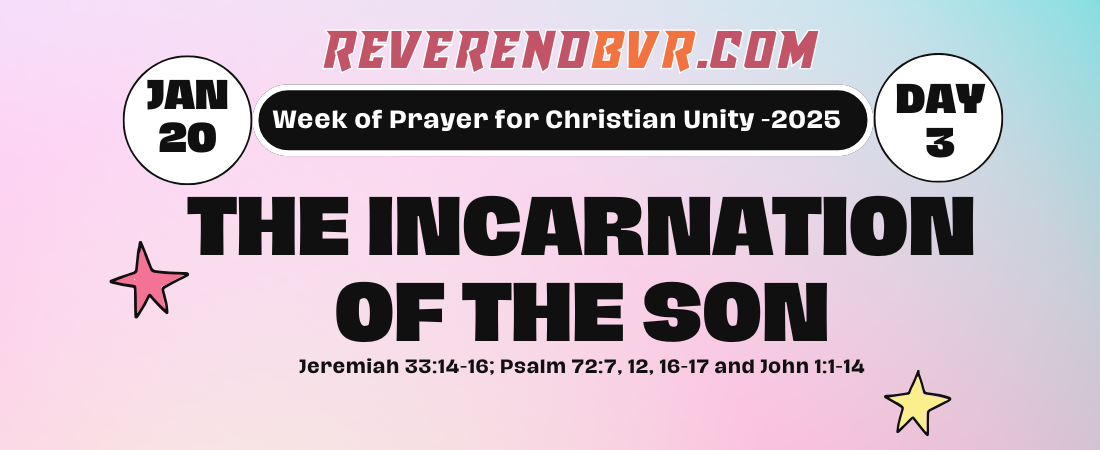Day 3: The Incarnation of the Son
Main Theme: “Do you believe this?” – Week of Prayer for Christian Unity
As we continue to journey through the Week of Prayer for Christian Unity, today’s reflection centers around “The Incarnation of the Son,” under the theme “Do you believe this?” The Incarnation is a foundational truth of the Christian faith—God becoming flesh in the person of Jesus Christ. But as we ask, “Do you believe this?” we are not only recalling a historical event but confronting the reality of what the Incarnation means for us today. How does this truth shape our understanding of who God is, who we are, and how we are to live in a world marked by darkness and struggle?
1. The Promise of the Righteous Branch (Jeremiah 33:14-16)
The passage from Jeremiah 33:14-16 speaks of a promise that God made to His people—one that points to the coming of a righteous Branch from the line of David. This prophecy gives us a glimpse into God’s plan to restore justice, righteousness, and peace through the coming of the Messiah. The righteous Branch, identified as “The Lord Our Righteous Savior,” would bring salvation and make it possible for Judah and Jerusalem to live in safety. It is a promise of hope, a promise that would be fulfilled with the arrival of Jesus Christ.
Jeremiah’s words, written hundreds of years before the birth of Jesus, remind us that the Incarnation is not an accident or an afterthought. It is the fulfillment of a divine promise. God, in His love and mercy, had promised that He would send a Savior—one who would make all things right and restore peace to a broken world. Jesus Christ, born of Mary, is the fulfillment of this promise. He is the Righteous Branch, the Savior who came to bring justice, truth, and salvation to all who would believe.
Application: Do you believe this promise? Do you believe that Jesus is the fulfillment of God’s promises? In a world where injustice and suffering seem overwhelming, the promise of a Savior who brings righteousness and peace offers us hope. The Incarnation means that God has not forgotten us or left us to struggle alone. He has entered into our world, bringing His righteousness with Him.
2. The Coming of the Righteous King (Psalm 72:7, 12, 16-17)
In Psalm 72, we find a prayer for the king—likely referring to King Solomon, but ultimately pointing forward to the Messiah. The psalm speaks of the king’s rule being marked by justice, compassion, and prosperity for all people. “For he will deliver the needy who cry out, the afflicted who have no one to help” (Psalm 72:12). This king will bring an abundance of good, making the earth flourish and blessing all nations. The reign of this king will be marked by peace, and his name will endure forever.
As we consider the Incarnation in light of this psalm, we recognize that Jesus is the fulfillment of these royal promises. He is the King who brings justice to the oppressed, who delivers the needy, and whose reign will never end. Jesus came not only to redeem humanity but to restore the kingdom of God on earth, where justice, peace, and righteousness reign.
Application: Do you believe that Jesus is the King promised in Psalm 72? Do you believe that He is ruling right now, bringing His justice and peace into the world? The Incarnation is a declaration that God’s kingdom has arrived in Jesus. As we experience the challenges of life, we are called to live in the reality of Christ’s kingship, knowing that His reign is one of justice and peace. This truth gives us hope for today and a vision for how we can live as citizens of God’s kingdom, working for peace and justice in the world.
3. The Word Became Flesh (John 1:1-14)
The Gospel of John opens with a profound declaration about the identity of Jesus: “In the beginning was the Word, and the Word was with God, and the Word was God” (John 1:1). The Word (Greek: Logos) is not a mere idea or concept; it is a person—Jesus Christ. This Word, who was with God and was God, took on human flesh and dwelt among us. “The Word became flesh and made his dwelling among us” (John 1:14). This is the heart of the Incarnation: God, the eternal Word, took on the fullness of humanity.
Jesus did not just appear as a divine being or a heavenly messenger; He became fully human. He experienced the world as we do—its joys, its sorrows, its pain, and its beauty. He lived among us, showing us what it means to live in relationship with God and others. And in His life, death, and resurrection, He made a way for us to be reconciled to God.
The Incarnation is a powerful reminder that God is not distant or removed from our struggles. He has come near to us in Jesus, embracing the fullness of human experience and revealing God’s love in the most intimate way possible. Jesus, the Word made flesh, shows us the heart of God and invites us to enter into a relationship with Him.
Application: Do you believe that Jesus is both fully God and fully man? The Incarnation is a truth that should reshape how we see God and how we see ourselves. It means that God is not distant or uninvolved; He is with us, walking alongside us in our joys and in our struggles. Jesus, the Word made flesh, shows us that God cares deeply for us and is actively involved in our world. This truth offers us comfort in our pain and assurance in our challenges.
4. The Incarnation: A Call to Believe
In light of the promises from Jeremiah, the kingship described in Psalm 72, and the profound truth of John 1, we are faced with the question: “Do you believe this?” The Incarnation of the Son is not merely a theological concept; it is a truth that calls us to respond. To believe in the Incarnation is to believe that God is with us, that He is present in the midst of our brokenness, and that He has the power to restore and redeem.
Jesus, the Word made flesh, is the answer to the deepest needs of humanity. He is the hope for the hopeless, the Savior for the lost, and the King who will one day return to make all things new. The question is not just whether we intellectually acknowledge the Incarnation, but whether we live in the reality of it. Do we believe that God is with us in Jesus? Do we allow this truth to shape the way we live, love, and serve others?
Prayer:
Lord God,We thank You for the incredible gift of Your Son, Jesus Christ, who became flesh and dwelt among us. We are in awe of Your love and grace that led You to take on our humanity, to walk among us, and to reveal Your heart to us. Help us to truly believe in the reality of the Incarnation—that You, God, are with us in every moment of our lives.
As we face the challenges of this world, may we find comfort in knowing that You are not distant, but near. May the truth of Your presence give us courage to live out our faith with boldness and hope. Help us to reflect Your love to those around us and to walk in the light of Christ, who came to bring peace, justice, and salvation to all.
In the name of Jesus, the Word made flesh, Amen.
As we continue to reflect on the truth of the Incarnation, may we remember that God has not abandoned us, but has entered into our world to redeem it. The Incarnation is a call to believe—not just in words, but in how we live. Do you believe this? If so, let it change everything.

